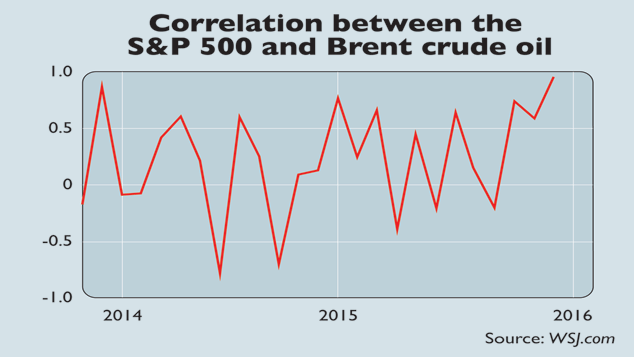
What a “perverse pattern”, says Gene Epstein in Barron’s. Equities and oil are joined at the hip. The correlation between the S&P 500 and Brent crude reached 0.97 in January (a figure of one would reflect perfect lockstep), the highest monthly reading since 1990. This makes no sense: “the overwhelming majority of global companies benefit from cheaper crude” – there are more oil consumers than producers. Yet traders are sticking to a “misguided belief” that low oil prices signal “imminent global recession”.
They are low because of a supply glut, not because demand is down. “On average, cheaper oil should be a good thing,” agrees Valentijn van Nieuwenhuijzen of NN Investment Partners. “But in this type of market it isn’t about the average, it’s about the fear of the unknown.” Investors have conflated weaker oil, China, emerging markets and softer US data into a generalised growth panic. As Olivier Blanchard, formerly of the International Monetary Fund, puts it, “investors worry that other investors know something bad, so they just sell”, even if they have no new data themselves.
Early this week, pan-European and UK stocks hit multi-year lows. Banks were hit hard, especially in Europe, where they could do with topping up capital and, unlike their American counterparts, still have bad loans “festering” on their balance sheets, as Max Colchester notes on The Wall Street Journal’s website.
Yet while the American economy may have lost some momentum lately, consumption, which accounts for 70% of GDP, remains robust. Household confidence is high and the labour market strong, with wage growth accelerating last month to an annual 2.5%. The drag from a stronger US dollar also looks set to fade now that interest-rate hikes are less likely.
Meanwhile, China’s economy is stabilising, which should calm shattered nerves in raw-materials and emerging markets. And emerging-market debt levels, which some fear could tear holes in bank balance sheets worldwide, are high but manageable, reckons Capital Economics: “only a handful of emerging markets now face significant risks, in contrast to previous region-wide crises”. That said, it’s worth bearing in mind that stocks frequently fall in the absence of any downturn – as American economist Paul Samuelson said: “Wall Street has predicted nine out of the last five recessions.”